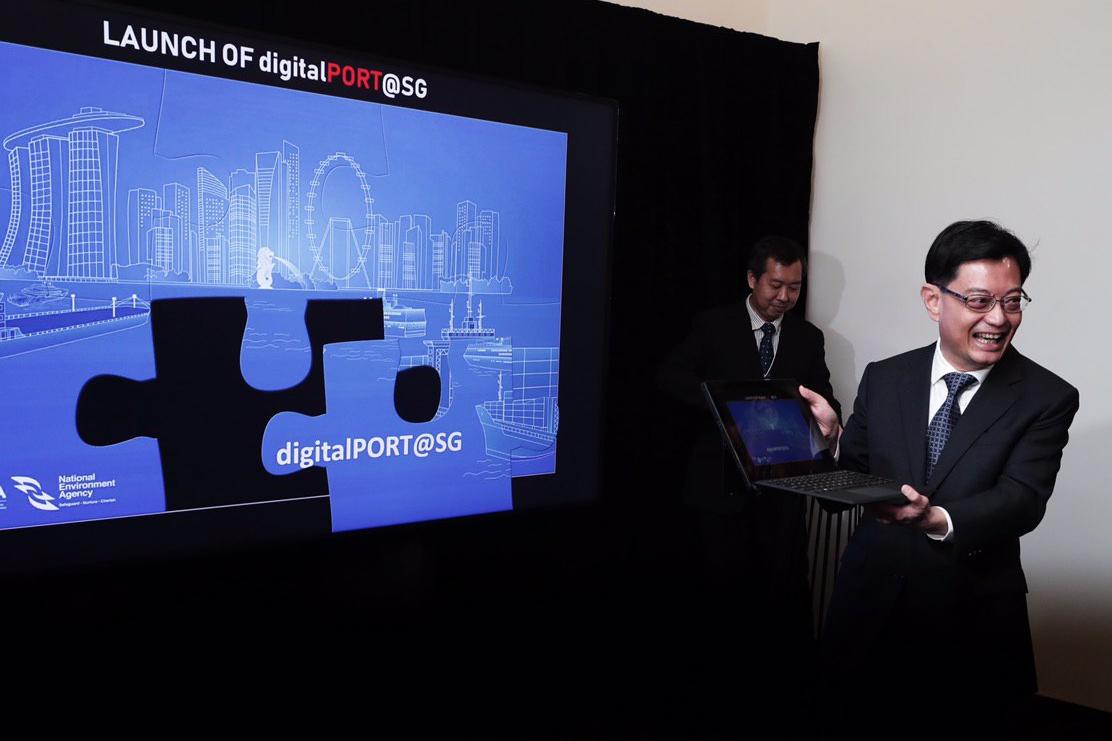Singapore launches new digital shopfront for terminal and marine services to improve port efficiency
Sign up now: Get ST's newsletters delivered to your inbox

The digital Portal for One-stop Regulatory Transactions, or digitalPORT@SG, simplifies the current reporting process required by three public agencies - MPA, Immigration and Checkpoints Authority and the National Environment Agency - for all arriving and departing ships here.
ST PHOTO: KELVIN CHNG
SINGAPORE - With over 80 per cent of global trade today travelling by sea and Singapore's position as a leading container hub port with the world's largest transhipment volumes, the Republic takes great interest in the future of the maritime sector and wants to contribute to it.
One crucial way for the sector to stay relevant and move ahead is to harness technology, Deputy Prime Minister Heng Swee Keat said on Wednesday (Oct 30) as he launched the Maritime and Port Authority of Singapore's (MPA) new digital platform for providing one-stop clearance for vessel-related transactions.
"The maritime industry has put Singapore prominently on the global map and it remains critical to the Singapore economy.
"Hence, we take a great interest in the future of the maritime industry, and we want to contribute to the development of the maritime community," said Mr Heng, who was speaking at the Global Maritime Forum Annual Summit at the Flower Dome in the Gardens By The Bay.
Besides technology, he said the sector also has to address climate change in areas such as emissions management as well as uphold a rules-based multilateral trading system.
Singapore is an international maritime centre housing over 150 international shipping groups and 5,000 maritime establishments, he shared, adding that new technologies are opening new possibilities for physical port infrastructure and port connectivity.
The new digital platform - Portal for One-stop Regulatory Transactions, or digitalPORT@SG - will simplify the current reporting process required by three public agencies - MPA, Immigration and Checkpoints Authority, and the National Environment Agency - for all ships arriving and departing here.
"This (digitalPORT@SG) will be rolled out progressively from December this year, and is estimated to save the industry 100,000 man-hours per year," said Mr Heng, who is also the Finance Minister.
A second phase over the next few years will see digitalPORT@SG become a single platform for the booking of terminal and marine services, allowing vessels to optimise their time spent in port.
"We also hope to make digitalPORT@SG interoperable beyond Singapore's shores, so that industry players can gain greater operational efficiency," said Mr Heng, adding that Singapore wants to contribute to the wider maritime community.
He said MPA has signed a Memorandum of Understanding (MOU) with the China Maritime Safety Administration for the seamless exchange of ship credential for port regulatory functions, and is similarly collaborating with Denmark, Finland and Panama.
In addressing climate change, Mr Heng said that Singapore fully supports the global maritime sector's sustainability efforts and believes it can do more.
For example, the country is ready for LNG bunkering, which is a "cleaner and greener fuel alternative", the Deputy Prime Minister said, adding that MPA has co-funded two LNG bunker tankers.
"The first tanker will be delivered in the third quarter of 2020. This will coincide with the anticipated increase in LNG demand, as more ocean-going LNG-fuelled vessels come into operation and call at our port," said Mr Heng.
He also shared that the Centre of Excellence for Maritime Energy and Sustainable Development has been set up at Nanyang Technological University, to "develop innovative solutions in the areas of sustainable maritime operations, emissions management and energy management".
It is also important to review and update global rules of trade and undertake "difficult structural reforms".
He said the maritime sector particularly benefits from global rules such as the United Nations Convention on the Law of the Sea, and such a system must continue.
Ms Quah Ley Hoon, chief executive of MPA, said: "The unprecedented pace of change we face today would affect maritime trade flows, transform business models and impact our collective commitment to sustainability."
She added that such demands present the global maritime community with opportunities to work together to address the issues.
Over 200 maritime industry experts and policymakers from 37 countries are attending the two-day Global Maritime Forum Annual Summit, which started on Wednesday.
Chairman of the forum Peter Stokes said that efforts, such as those in tackling carbon emissions, require individuals and organisations to collaborate and formulate strategic plans, and then mobilise the required level of support to carry them out.
"As we all know, this is not, in the past, the norm for the maritime industry, which has tended to operate in silos and value independence," said Mr Stokes.
He said that the Global Maritime Forum hence brings together leaders from across the maritime spectrum, to exchange ideas and create solutions for challenges.


